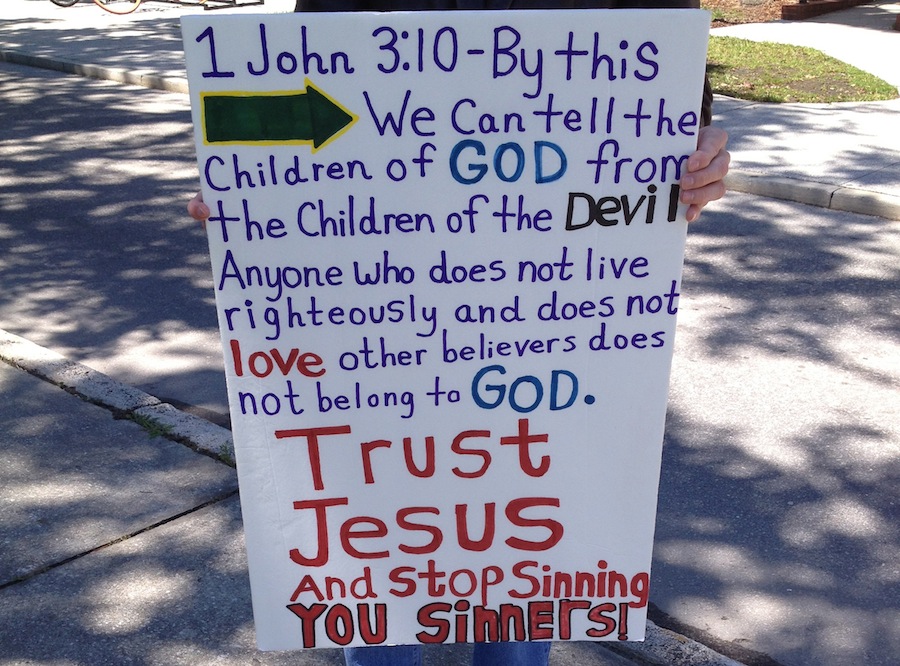 By Hannah Bleau | gargoyle@flagler.edu
By Hannah Bleau | gargoyle@flagler.edu
I walked down the library steps to approach the now infamous Flagler College street preachers. My heart was filled with so many emotions. Intrigue. Curiosity. Disgust.
I quickly read their signs. “Fornicators, rebellious women, money lovers, sinful Christians, pot smokers, religious people, sports nuts: judgment. Trust Jesus and stop sinning you sinners!”
Great, I thought to myself. This is exactly what this campus needs. Unbalanced religious people who misrepresent the character and nature of God and Christians everywhere. This is the version of Christianity the media eats up. This is why they call me a homophobe, Bible thumper and Jesus freak.
I have no problem being challenged for my beliefs. Yes, I love God and have moral values that are unmovable. Call me whatever you like. But take it from me: I’m not that.
I went up to them and it just blurted out. “Do you guys seriously think you’re spreading the love of God this way? Standing on a street corner, telling gay people they’re going to hell and telling Christians they don’t really love God if they slip up and tell a lie?”
We calmly debated. He distortedly quoted more scriptures than I could count. He held up the Bible to my face. He litigated his case, but something was missing from every word that came out of his mouth.
We don’t need a sign shoved in our face to show us our faults. We instinctively know what’s right from wrong. What man can’t comprehend is the extravagant love God has for all of mankind, and I guess that message wasn’t coming across with the sign saying “Trust Jesus and stop sinning you sinners!”
The Bible is a love story. It’s a story of redemption. It’s a story of the human race screwing up time and time again. It’s the story of God’s unmerited love for you.
I hope others do not misunderstand me. I’m not saying that everything is permissible. I have strong core beliefs of what is right and wrong, but I also think yelling at people who don’t know or understand the nature of God (screaming “judgment” and “hell bound”) is wrong too. Why? Because it’s misrepresenting the very character of God.
I was trying to understand the psychology of the street preachers, and I realized they really believe they are shining God’s light on our campus. They really believe they are out there saving souls for the kingdom of God. At the same time, I watched students walk by, rolling their eyes and telling them off under their breath- and I couldn’t blame them one bit. I’m a Christian and I practically was.
These guys have zeal, but their perception of God is all wrong.
God is love. It’s the goodness of God that brings men to repentance, not the fear of judgment or threat of going to hell.
It got me thinking. If it rubbed me the wrong way as a Christian on campus, how much more did it make the non-Christians feel? Why would they want anything to do with this God who was so condemning and harsh? After all, if it’s about being perfect, why even bother?
The street preachers really think they’re doing the campus a justice, but making people feel like God hates them is not the message of Jesus at all.
The reality of God is this: “Don’t you see how wonderfully kind, tolerant, and patient God is with you? Does this mean nothing to you? Can’t you see that his kindness is intended to turn you from your sin?” (Romans 2:4) It’s His goodness that brings us to Him. Not the fear of punishment or threat of going to hell.
So “Christian” or “non-Christian,” hear me out when I say this: The way the media portrays Him. The way fanatic street preachers portray Him. It is not so. You want to know what God is like? God is love.
People tend to represent God the way they see Him. I want Flagler College to know that those fanatics don’t represent the other Christians on our campus, and they certainly don’t represent God. I have always been the person who gets upset when another person or group misrepresents a set of beliefs, but the other believers stay silent for the sake of peace. I wasn’t about to make the same mistake.




Be the first to comment on "The psychology of a street preacher"